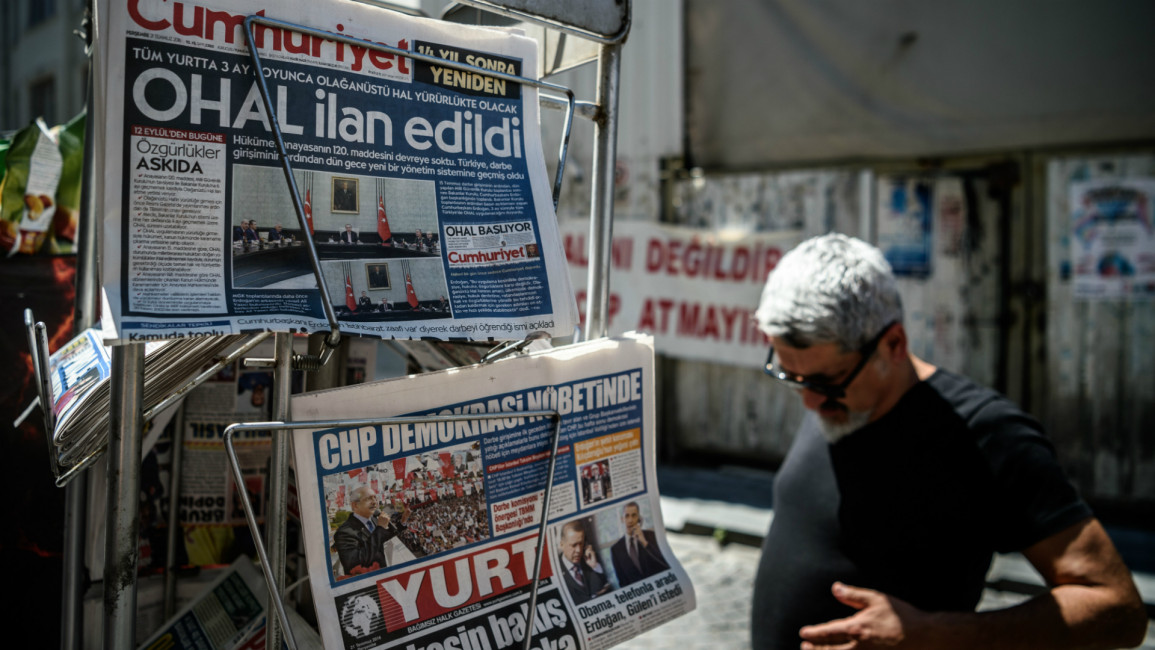Turkey: Heightened media censorship threatens critical reporting
Freedom of press in Turkey took another hit this week with reports that at least eight independent news and current affairs-focused TV channels have been closed in the past week.
On 4 October, officials from Turkey's state-owned media watchdog RTÜK - accompanied by police - forcibly shut down three Istanbul-based news channels.
Those affected were IMC TV, Hayatın Sesi TV, TV10, and Ozgur Radyo. In the days before, authorities had also shut down five news channels broadcasting in Kurdish.
In a statement released on Friday Human Rights Watch said that the latest batch of closures to take place following the failed July coup effectively ended "critical television news reporting" in Turkey.
"The latest move to censor media, under cover of the state of emergency imposed following the 15 July coup attempt, exceeds any legitimate restriction justifiable on national security grounds and violates the government’s freedom of expression obligations," read the statement.
Heightened censorship
In July, Turkey issued a decree listing 131 media and publishing outlets for closure with additional provisions to shut down any additional outlets deemed "to be a threat to national security or linked or in contact with terrorist groups".
RTUK, Turkey's official government-controlled media watchdog is believed to be in charge of implementing closures. However, it is yet to make any public statement confirming officially which media companies have been closed, and the reasons for their closure.
Restrictions on journalists in Turkey have become severe since the failed 15 July coup. Emergency powers, extended for 90 days on 3 October, mean that the Erdogan-headed Turkish cabinet can rule by decree without effective scrutiny by parliament.
"Fears that the government would make opportunistic use of the state of emergency to silence critics who have nothing to do with the 15 July coup attempt have come true," said Emma Sinclair-Webb, Turkey director at Human Rights Watch.
"This week's closure of TV and radio channels popular with Kurds, the Alevi religious minority, and supporters of opposition parties takes Turkey back to the old days and shows that the government wants no version of the news on television or radio other than its own."
On 1 October Justice Minister Bekir Bozdag defended the government's closure of more than 100 media outlets after opposition leader Kemal Kılıcdaroglu called the systematic closures a "putschist tradition".
"It does not befit political parties to be supporters of the supporters of terrorism with the excuse of freedom of speech," Bozdag said in response.
In addition to closures of media companies since the failed July coup at least 120 journalists have been arrested and face criminal investigation for their writing. A further 2,000 have lost their jobs due to the closures. Some of those who have been detained have said they faced physical and sexual abuse.
— Thomas van Linge (@arabthomness) October 4, 2016
" style="color:#fff;" class="twitter-post-link" target="_blank">Twitter Post
|
— Mahir Zeynalov (@MahirZeynalov) October 4, 2016
" style="color:#fff;" class="twitter-post-link" target="_blank">Twitter Post
|


![Minnesota Tim Walz is working to court Muslim voters. [Getty]](/sites/default/files/styles/image_684x385/public/2169747529.jpeg?h=a5f2f23a&itok=b63Wif2V)




![Debris near Rafic Hariri International Airport [Getty]](/sites/default/files/styles/image_330x185/public/2176162423.jpeg?h=a5f2f23a&itok=MCSK9mkM)
![An Israeli air strike on Jabalia killed teenage journalist Hassan Hamad [Screengrab/X]](/sites/default/files/styles/image_330x185/public/2024-10/hassan%20hamad1.jpg?h=c12e0b96&itok=Rd_dyCVp)
